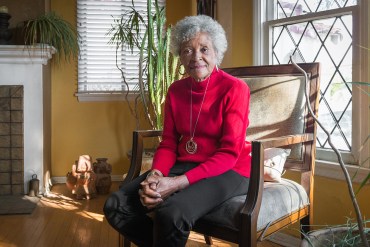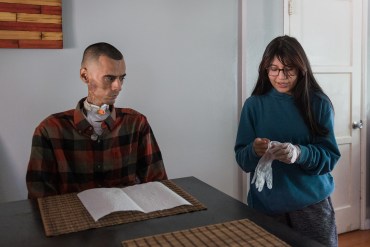Inmates’ Distrust of Prison Health Care Fuels Distrust of Covid Vaccines
Many inmates at Western Missouri Correctional Center, like their peers in prisons across Missouri and the nation, are hesitant about getting vaccinated against covid-19 because they don’t trust prison health care.
Stop Blaming Tuskegee, Critics Say. It’s Not an ‘Excuse’ for Current Medical Racism.
The Tuskegee syphilis study is often cited as a reason Black Americans might hesitate to take the covid-19 vaccine. But many people say that current racism in health care and lack of access deserve more attention to move more Black Americans toward vaccine protection.
Birx Joins Air-Cleaning Industry Amid Land Grab for Billions in Federal Covid Relief
Air-cleaning companies with limited oversight are targeting a growing market of schools desperate for covid-19 protection. Donald Trump’s former covid adviser lands with one that built its business, in part, on ozone-emitting technology.
Indiana School Goes Extra Mile to Help Vulnerable Kids Weather Pandemic
Many students at Sarah Scott Middle School in Terre Haute, Indiana, deal with poverty, dysfunction and stress. Since the pandemic hit, teachers and administrators have struggled to give kids and families the support they need.
‘Press 1 for English’: Vaccination Sign-Ups Prove Daunting for Speakers of Other Languages
In Virginia, if you called 1-877-VAX-IN-VA to register for a vaccine and wanted help in a language other than English or Spanish, the system might hang up on you.
Ya te has vacunado contra covid. ¿Y ahora qué?
Más y más personas se vacunan cada día, justo cuando comienza la primavera. Pero, ¿están totalmente protegidos? Todavía hay preguntas por contestar y reglas que cumplir.
The Hype Has Faded, but Don’t Count Out Convalescent Plasma in Covid Battle
The once-promising therapy that infuses blood plasma from recovered covid-19 patients into newly infected people, theoretically to boost immunity, has suffered setbacks. But some proponents say it’s too early to abandon the treatment.
Some Dream — Others Scheme — To Find a Vaccine Before Spring Break
It’s the second spring break of the pandemic, and rumors abound about people exploiting loopholes to get vaccinated in order to party. But some students who’ve been immunized were eligible because of where they work or underlying health conditions.
In America, Covid Vaccine Eligibility Is a ‘Crazy Quilt’ of State Rules
Across the country, a mishmash of rules to qualify for a precious covid shot is creating nightmares for consumers. Criteria including age, occupation and medical conditions vary dramatically.
So You’re Vaccinated Against Covid. Now What?
The vaccination rollout has been unsteady, but the vaccines seem very effective, raising hopes that the pandemic will subside by later this year if enough Americans get their shots. Meanwhile, remain cautious.
El caso de la donación de vacunas contra covid estadounidenses al extranjero
Expertos felicitan las acciones de la administración Biden con las vacunas de covid, pero creen que en los próximos meses debería haber un enfoque global para que el mundo esté innmunizado.
Blue Shield Spent Years Cultivating a Relationship with Newsom. It Got the State Vaccine Contract.
Insurance giant Blue Shield of California has made millions in charitable and political donations to Gov. Gavin Newsom over nearly two decades, largely to his dearly held homeless initiatives. In turn, Newsom has rewarded the insurer with a $15 million no-bid contract to lead the state’s covid vaccination distribution.
The Case for Donating US Covid Vaccines Overseas
For now, there’s not enough vaccine for the U.S., but that could change within a few months. Vaccinating other nations will be key to stopping the pandemic – and keeping it away from our shores.
Condados más ricos del país, abrumados por el aumento del hambre infantil
Los incrementos más pronunciados se registran en algunos de los condados más adinerados, donde la riqueza general oscurece las frágiles finanzas de los trabajadores con salarios bajos.
Centro de vacunación “gigante” ofrece alivio a trabajadores de la alimentación
El área de Long Beach, que tiene su propio departamento de salud, abrió un mega sitio de vacunación contra covid enfocado en un grupo vulnerable: los trabajadores de la industria de alimentación.
Need Amid Plenty: Richest US Counties Are Overwhelmed by Surge in Child Hunger
Hunger among kids is skyrocketing, even in America’s wealthiest counties. But given the nation’s highly uneven charitable food system, affluent communities have been far less ready for the unprecedented crisis than places accustomed to dealing with poverty and hardship.
Landmark Covid Relief Law Pumps More Than $100 Billion Into Public Health
The law provides money to enhance coronavirus testing and contact tracing, support federal efforts on vaccine distribution and hire more public health workers. But advocates worry support will wane when the pandemic is over.
‘Super-Sized’ Vaccine Clinic Offers Food Workers Some Relief
Long Beach, which has its own health department, kicked off a vaccination campaign for essential workers by inviting 3,000 food workers to a splashy vaccination event at the city’s convention center.
Doctors Debate Use of Blood Thinners to Prevent Clots in Women After C-Sections
One group of maternal health experts in 2016 urged doctors to give all women heparin shots after C-sections, barring specific medical risks for individual patients. But many physicians disagree, questioning whether wide use of the drug is effective, worth the cost and safe, since it carries the risk of bleeding.
Role Reversal: Covid Increases Ranks of Child Caregivers
Millions of teens and preteens help care for ill parents or grandparents. The pandemic has boosted their numbers while making it harder for them to get social and emotional support outside the home.
























